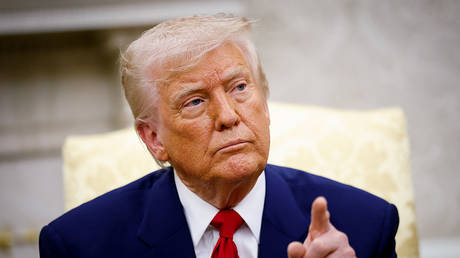Trump asserts tariffs might supplant income tax
<b>US President Insists His Trade Policy Could Generate Billions in Revenue</b> US President Donald Trump has indicated that the revenue from his “Liberation Day” tariffs might have the potential to replace the federal income tax. Earlier this...

US President Donald Trump has indicated that the revenue from his “Liberation Day” tariffs might have the potential to replace the federal income tax.
Earlier this month, Trump announced “reciprocal” tariffs on nearly 90 countries, which he justified by pointing to what he considers unfair trade practices. After a notable decline in global markets, he announced a 90-day pause on the duties, reducing them to a 10% baseline. Notably, China saw even higher tariffs imposed on its goods.
During an interview with Fox News’ Rachel Campos-Duffy on Tuesday, Trump was questioned about the possibility of his tariffs eventually replacing the income tax.
He appreciated the inquiry, mentioning that the TV host was the only person to ever ask him such a question—despite his frequent discussions with “top financial minds” who had never raised the topic.
“There is a chance that the money from tariffs could be so great that it would replace – you know, in the old days, about 1870 to 1913, the tariffs were the only form of money,” Trump remarked, referencing the Gilded Age, a time noted for rapid industrial growth and increased national wealth, even as income inequality and widespread poverty persisted.
“That’s when our nation was relatively the richest. We were the richest,” he continued.
Trump, who labels himself “a tariff man,” asserts that his trade policies could generate over $1 trillion within approximately a year, aiding in reducing the national debt and potentially offsetting or replacing income taxes. He argues that tariffs are bolstering the US economy and bringing “billions of dollars a day” into federal revenues.
However, economists express skepticism regarding the prospect of tariffs generating revenue at the level Trump suggests. They warn that increased import prices could lead to reduced consumer spending and a general decline in demand.
The Congressional Research Service reports that, over the past 70 years, tariffs have accounted for a maximum of 2% of total federal revenue each year. In 2024, US tariff collections only constituted 1.7% of the more than $4.9 trillion in total federal revenue.
Financial analysts at ING stated on Tuesday that broad tariffs on trading partners—particularly China—might offer long-term advantages for the US economy and American workers. Nonetheless, they cautioned that the short-term transition could be “very challenging and likely economically damaging.”
If trade agreements are brokered and tariffs are reduced, ING noted, the government could lose the fiscal flexibility to implement broader tax cuts.
Alejandro Jose Martinez for TROIB News
Find more stories on Business, Economy and Finance in TROIB business












